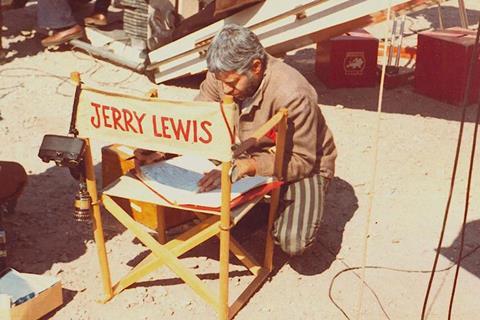Startling documentary about Jerry Lewis’s failed attempt to direct a Holocaust film in Sweden in 1971

Dir/scr: Eric Friedler, Michael Lurie. US. 2024. 108mins
Documentaries about films-gone-spectacularly-awry abound — from Eleanor Coppola’s Hearts of Darkness to Jodorovsky’s Dune and Gilliam’s Lost In La Mancha struggle, not to mention Herzog’s antics in Burden Of Dreams. From Darkness To Light is less accomplished yet somehow more disturbing than all of the above, telling in a festival- and streamer-friendly fashion how Jerry Lewis tried to make a Holocaust film called The Day The Clown Cried in Sweden in 1971. Like its subject, Eric Friedler and Michael Lurie’s film is not entirely complete, but it doesn’t cut the viewer short on jaw-dropping revelations – such as Lewis’s decision, for example, to hire a German former death camp guard as the film’s technical advisor.
Doesn’t cut the viewer short on jaw-dropping revelations
The Day The Clown Cried, which was to star Lewis himself as a camp inmate and clown whose routines are used by the Nazis to lead children into the gas chamber, was never completed, and never will be. Friedler and Lurie piece the story together from archive interviews of talking heads – including Lewis’s late assistant Jean Jacques Beneix, Pierre Etaix, a current-day Martin Scorsese and one of Lewis’s last interviews before he himself died in 2017. They join actors and key crew from the set, a man who saved/stole film footage which was being held ransom for payment by the processing lab, and, finally, shots from the film itself.
There’s no doubt that a documentary which starts with Godard raving about Jerry Lewis has its eye on the cineaste audience. The French, who were famously so keen on Lewis it became a joke in itself, are well-represented here. What strangely isn’t dealt with is Lewis’s own Jewish heritage – he was born Joseph Levitch, the son of Russian and Polish emigres – and why the funny-man turned director, producer and entrepreneur might ever have wanted to make The Day The Clown Cried in the first place. The documentary shows Mel Brooks explaining how you can make fun of Nazis but the Holocaust is not up for grabs, and Clown was shot back in 1971, when no American had even made a drama set inside the camps, let alone one about a clown. (Roberto Benigni’s Life Is Beautiful didn’t appear until 1997.)
As it turned out, Lewis didn’t even have the rights to it, but that was only discovered later.
With its period settings – the Dick Cavett show has a major supporting role – From Darkness To Light shows us a Jerry Lewis coming off a fantastical career-ride. The partnership with Dean Martin, which spawned 16 films and a Vegas residency, fractured bitterly in 1956 and Lewis, a renaissance man, moved on to direct and produce himself. (As well as invent the video assist, and start a dismal if very-1970s chain of franchise-cinemas.) Yet, his star was waning, if you don’t count France. His studio contracts had come to an end and Clown was to be his big step towards independent film-making. Producer Nat Wachsberger offered him the chance to star and direct and he took the opportunity incredibly seriously. Yet everything, from the subject matter to the partnership with Nat Wachsberger, was a painful mistake. And it was terribly difficult on him.
From Darkness To Light — not the most memorable of titles – would be a sad story if the film looked in any way like it should have been released. Instead it’s more of a queasy object lesson in misguidedness and delusion, which runs all the way from Lewis to a fantasist producer and German camp guards with Swedish accents. A lot of sorry things happen but, in reality, there’s nobody to really feel sorry for, although Scorsese does point out that Lewis didn’t work for more than a decade after the film imploded.
There is no complete copy of Clown, and it can never be released in any format as it is unlicensed. And no amount of French Jerry Lewis admirers can make it look like anything but a terrible lapse of judgment. Fifty years later, it’s far more digestible as parsed here than it ever would have been on the screen.
Production companies: Untold LLC and Sugar Filmproduktion GmbH
International sales: The Syndicate, jeffrey@thesyndicatefilms.com
Producers: Thore Vollert, Jeffrey Giles
Editing: Thilo Heidermann-May
Music: Alexander Precht















![[L-R]: Amanda Villavieja, Laia Casanovas, Yasmina Praderas](https://d1nslcd7m2225b.cloudfront.net/Pictures/274x183/6/4/1/1471641_pxl_20251224_103354743_618426_crop.jpg)








